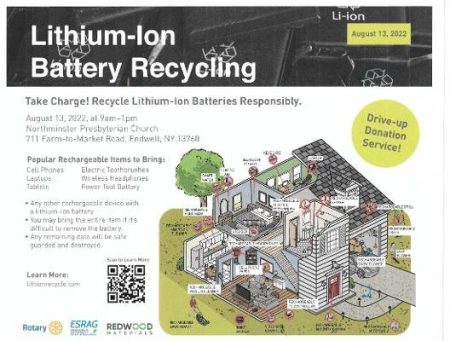Mass electrification demands more rechargeable batteries that require lithium and other rare minerals. Through ESRAG’s new lithium-ion recycling project, Rotarians are engaging their communities in a smart circular economy step to accelerate climate solutions. “The largest lithium and cobalt reserves in the western hemisphere sit in America’s junk drawers,” says JB Straubel, founder and CEO of Redwood Materials, the United States’ only recycler of used lithium-ion consumer batteries. Rotary, Rotaract and Interact Clubs, starting in the United States, have begun recovering thousands of pounds of lithium-ion batteries whose rare minerals can be recycled almost indefinitely.
“Redwood Materials’ Battery Materials Campus in Northern Nevada, US reclaims over 95% of these precious metals,” says Rotarian Joe Richardson, who organized four Rotary-sponsored collections in Frederick County, Maryland (US) this fall. Redwood Materials just announced their second Battery Materials Campus in Charleston, South Carolina, increasing their capacity to recycle, refine, and remanufacture critical battery materials.
Under a memorandum of understanding between ESRAG and Redwood Materials negotiated by ESRAG Director Clari Nolet, Rotary Clubs in California, New York, Massachusetts, Nevada, and Maryland have already carried out community recycling events netting over 7,600 pounds of rechargeable batteries. ESRAG’s lithium-ion project has a website explaining the impact of this strategy and how to easily participate, using their turnkey project plan and marketing materials.
Myriad articles document the humanitarian and environmental dangers of lithium and cobalt mining. The growing demand for battery materials outstrips the supply of nickel, lithium, cobalt and copper. These metals are scarce and are controlled by third world countries. The current 50,000+ mile global supply chain is neither environmentally sound nor efficient. The shortage of essential materials and the vulnerability of this supply chain are major roadblocks to sustainable transportation.
“Redwood is an energy transition company,” explains Sonja Koch, who leads Redwood’s collaboration with ESRAG. “Batteries are the solution that will allow electrification of the vehicle fleet to displace fossil fuel usage and help address climate change globally. To make electric vehicles and energy storage products fully sustainable and affordable, we need to close the loop at the end of their life. This process means not just collecting and recycling the batteries but also fully refining the metals we recover and finally, remanufacturing them into precision battery materials (anode and cathode).
Today, Redwood is receiving ~8 GWh of lithium-ion batteries, which equates to about 100,000 cars or more than 20k metric tons/year. The large majority of lithium-ion batteries recycled in North America come through our doors. We can recover more than 95% of the critical minerals and rare earth elements from batteries and then reintroduce those materials back into the supply for U.S. battery manufacturers.”
Through this ESRAG-Redwood collaboration, your club can educate the public about the opportunity to contribute their spent or obsolete lithium-ion batteries to this strategic use, as well as the importance of diverting them from landfills where they can cause fires and deaths (and are illegal). It’s a wonderful way to embody the Four Way Test of being beneficial to all concerned. Redwood accepts all products with rechargeable lithium-ion batteries, including cellphones, laptops, tablets, electric toothbrushes, vaping devices, electric shavers, Bluetooth speakers, video game batteries, and wireless headphones.
“Customers were very thankful for the opportunity to drop off batteries and products with the batteries,” reports ESRAG member Jeff Smith, District 7170 Environmental Chair, who has completed several lithium-ion battery recycling events in the Southern Tier of New York State. “We advertised lithium-ion batteries and devices only but will accept most types of batteries: Redwood Materials will take these batteries and responsibly recycle them.”
Rotary Clubs can educate their communities and mobilize Rotaract and Interact Clubs to collect used lithium-ion batteries and devices to go directly to the recycler – Redwood Materials. It’s a concrete action local families and businesses can take to contribute to a major climate solution and the security of their country’s supply chain.

Good work, I would like to learn more.
Great project. Our club is interested in starting such a drive but we are in Canada (Rotary Club of Toronto). Does Redwood operate in Canada or can it recommend a recycler to work with?
How can I be member of the club so I Can start working with the local rotary club?
Thank you for your comment on our blog. Please tell me where you live so I can help you find a local Rotary Club.